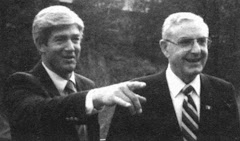Take the case of Ginger Davis of Canyonville, OR, who some years ago was the sole survivor of a two-car violent crash that claimed seven lives. Davis caused the deadly crash; she was dead drunk with a blood alcohol level of .23, way over the legal limit. Two of the victims were her own children. And this accident happened because nobody until then had taken the problem seriously enough to create a real deterrent.
Davis had a long history of alcohol problems, going back to high school. She had several previous drunk driving arrests, lost her license, but still continued to drive. Then one day in 1991 she was involved in an accident in Nevada. She left the scene, bought more liquor, and 24 hours later in Utah, she hit a car occupied by two Salt Lake physicians and their three children. Everyone in that car, plus the two children in Davis's car, were killed.
The judge's words, typical courtroom lip service, were harsh, but not his sentence. Five of the vehicular homicide charges were dropped in a plea-bargain "deal." It was as if five of the killed didn't even count. Davis received two sentences of from one to 15 years.
The Oregon legislature had NEVER proposed or passed a law to really protect the public from the deadly drunk driver. It's time to be realistic: people consume alcohol legally. Drunk driving is a topic people don't really want to think about. The voting public, and even the judges, often seem to take the attitude, "There, but for the grace of God, go I." Alcohol is a legal intoxicant, but driving impaired isn't legal, and it's deadly. And yes, it IS preventable. Ask those now spending their lives in wheelchairs how important this is.
The legislature started by allowing the police officer to draw blood to ascertain the amount of alcohol consumed. Then the breath testing machine was used. Both are all about evidence AFTER THE ARREST; they don't stop someone from driving. If you've lost a loved one to a drunk driver, or seen a dead body at the crash scene, experienced the screams, pain, horrible smells of blood and oil, seen all the broken glass on the highway - then it is real to you. Then you care, and you'll ask WHY this drunk was still out driving a car, when a REAL DETERRENT is possible.
Today we need to save money. We have a representative from Bend who wants to have police officers testify by phone at implied consent hearings, so they won't have to be paid for court time. But only a REAL DETERRENT will ultimately save money. When will the legislature become PROactive instead of REactive, start passing laws that will really prevent driving drunk, and save lives?
What am I talking about? What is a "real deterrent"?
The Oregon legislature has failed miserably for the past 60 plus years in this area. Nobody has had the GUTS to propose or pass a law that will make the drunk THINK before he gets into a car. The diversion program has some very good points, and if its classes on drinking an driving worked in every case, the recidivism rate for drunk driving wouldn't be so extremely high. And punishment for driving drunk has always been light.
If the legislature passed a law mandating a year in jail, no exceptions, for the second drunk driving offense, regardless of a previous diversion program, the certainty of a stiff sentence would finally make drinkers think before getting behind the wheel of a car. Conviction would cause hardship for their families, cost their jobs.
Jail space? No problem; after 6-8 months of this sentencing, word of mouth and a good media campaign would alert the drinking public that a designated driver is a necessity, because the alternative, a year in jail, would devastate their lives.
Let's see: who wouldn't benefit from this law? Emergency room doctors; florists; defense attorneys; physical therapists; tow truck operators, wheel chair manufacturers. The obituaries will be shorter lists. And the ACLU is sure to find something wrong with it.
Come on, legislators! Stop worrying about your next election, and pass a REAL DETERRENT to drunk driving! Let's save some Oregon lives, and set an example for the nation to follow.
Walt Wagner





